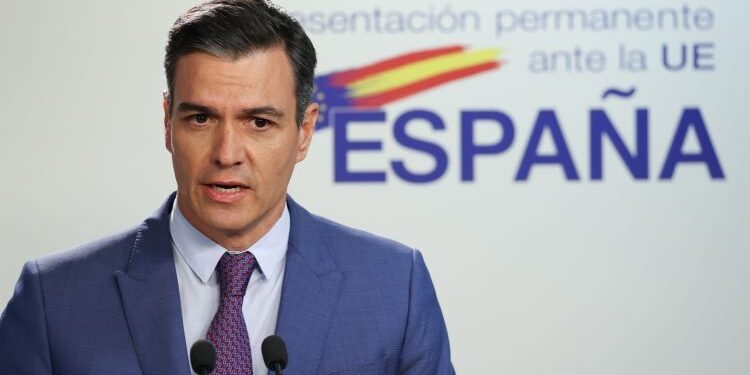Eduardo González
European Union leaders urged yesterday to “complete and improve the interconnection of European gas and electricity networks” in order to reduce Russian energy dependence and to take advantage of “the potential of the Iberian peninsula to contribute to the European Union’s security of supply.” They also reached an agreement to boycott imports of oil and petroleum products “supplied from Russia to the Member States” by sea but accepted “a temporary derogation for crude oil supplied by pipeline” in order to avoid Hungary’s veto.
This minimum agreement, agreed in the early hours of Monday to Tuesday, “immediately covers more than two thirds of Russia’s oil imports, cutting off a huge source of financing for its war machine”, declared the President of the European Council, Charles Michel. It has also allowed to avoid the veto of Hungarian Prime Minister Viktor Orban, the leader closest to Putin within the EU and who has even agreed to pay in rubles for the purchase of Russian crude, as demanded by Moscow. The agreement will also allow supplies to the Czech Republic and Slovakia, which, like Hungary, receive oil directly from Russia through the Druzhba pipeline.
The embargo on Russian oil will be implemented in two phases: a first phase, to be implemented within six to eight months for imports by ship, and a second phase, to be implemented “as soon as possible” and which will affect “the temporary exception for crude oil supplied by pipeline”. In any case, the European Council has asked “all countries to join the EU sanctions” and to prevent “any attempt to circumvent the sanctions or to help Russia by other means”.
“In this European Council it has been clear, once again, that Europe protects us and that we must protect Europe from its external enemies, and also from its internal enemies who want to dissolve it,” said the Prime Minister, Pedro Sánchez, yesterday at the press conference following the Extraordinary Council, held on May 30 and 31 in Brussels. “Europe protects families and businesses against the war in Ukraine as it protected them against the pandemic, with determination and unity, and the Government of Spain will always protect Europe with the same determination and unity,” he added.
The sixth package of sanctions on Russia over the invasion of Ukraine also includes the exclusion of three more Russian banks from the Swift payment system, a broadcast ban on three more media outlets to continue fighting Russian propaganda and disinformation, and the provision of auditing or consulting services to Russian entities. In addition, the restrictions extend to other dual-use goods and chemicals and to more than 15 entities and 50 individuals, including military personnel involved in the Bucha massacre and individuals associated with some oligarchs. On Tuesday morning, Ukrainian President Volodymir Zelensky made a video-conference address to the European Council in which he urged European Union leaders to stop financing “Putin’s war machine”.
For her part, the State Secretary for Foreign Affairs, Ángeles Moreno Bau, declared yesterday in Madrid, during an informative meeting of Nueva Economía Fórum with the political advisor and deputy director of Zelenski’s Cabinet, Ihor Zhovkva, that the new sanctions against Russia will have “negative effects” on the European populations, but “the cost of not adopting them would be much higher”.
Energy
The Council also addressed the consequences of the Ukrainian war on the energy, food security and safety sectors. On energy, European leaders urged “investment and completion of infrastructure for existing and new projects, including liquefied natural gas and electricity interconnections” and the promotion of “renewable energy production”, as well as harnessing “the potential of the Iberian peninsula to contribute to the European Union’s security of supply”. Spain and Portugal have repeatedly insisted that the Iberian energy hub can be an alternative to energy dependence on Russia because the two countries have ten regasification plants, representing more than half of Europe’s regasification capacity. However, they have also warned, for this to be possible it is necessary to complete the energy interconnections between Spain and France.
In the same vein, Sánchez stressed the importance of REPowerEU, the European Commission’s plan to end dependence on Russian fossil fuels, including the interconnections of the Iberian Peninsula, a project that “will not only benefit Spain, but the EU as a whole, due to the large regasification capacity of our country”. According to the head of the Executive, the “Iberian exception” responds to the particular characteristics and needs in the short term, but that it is necessary to go “beyond”. For this reason, Spain and other Member States defend the introduction of a ceiling on gas prices at European level, and the EU itself has asked the European Commission to propose different options. “This is a very important step forward and moves in the right direction: to protect citizens and companies from high energy prices due to Putin’s unfair war that is affecting their competitiveness,” said Sánchez, who also defended before the 27 the need to accelerate the energy transition and the deployment of renewable energies.
The debate on energy also included a reflection on the design of the electricity market, which, according to the Spanish government, “does not respond to situations such as the current ones”, so the president urged to “reform it to adapt it to stressful situations and prepare it for a decarbonized economy”. The harmony between Spain and Portugal on energy matters is such that Pedro Sánchez, who arrived late in Brussels because of his participation in Madrid in the events marking the 40th anniversary of Spain’s accession to NATO, was represented in the early stages of the Council by the Portuguese Prime Minister, Antonio Costa.
On the other hand, Pedro Sánchez has requested an appearance before the Congress of Deputies to report on the extraordinary European Council. The head of the Executive will participate again in another European Council meeting at the end of June, coinciding with the end of the French Presidency of the EU Council.






